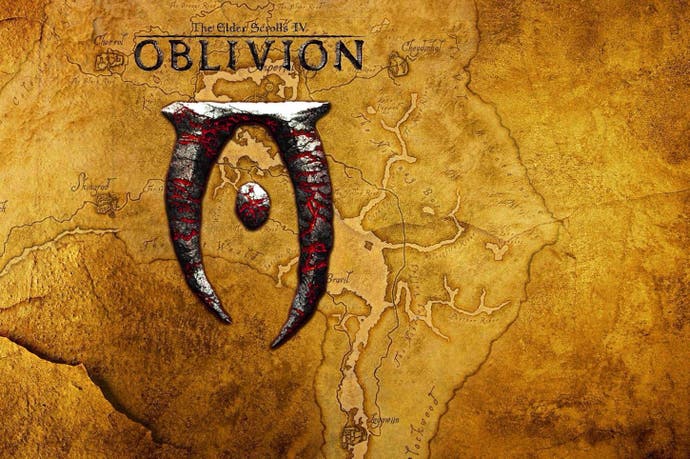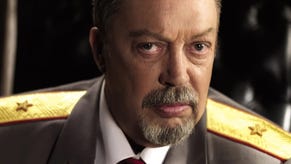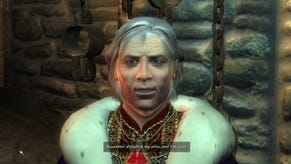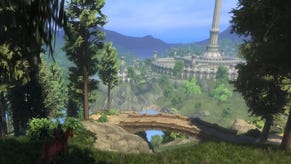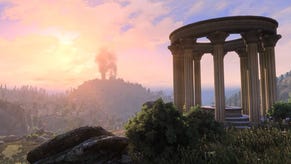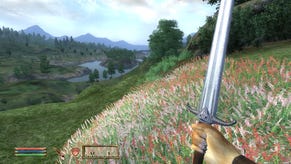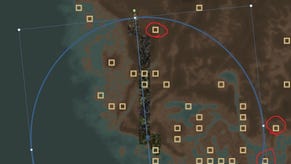In defence of Oblivion
Elder Scrolls to the bottom.
When does a console generation arrive?
Most people would agree that the seventh gen started when the Xbox 360 launched but that answers a different and thoroughly less interesting question.
It isn't unreasonable to say that the 360 era arrived on the carrier wave of Patrick Stewart's Royal Shakespeare Company tones announcing the final hours of the life of Uriel Septim 7, god-emperor of Tamriel, whose death serves as the starting gun for The Elder Scrolls 4: Oblivion and quite arguably the golden age of western RPGs that followed. A golden age that includes The Witcher 3, as if anyone needs to be reminded.
In a year when its predecessor Morrowind has been beautifully enshrined by TES Online, and its successor Skyrim enjoys yet another instance of two different versions of itself competing in the charts, it's tempting to think of Oblivion as the forgotten stepchild of the series. Its high-fantasy setting is an altogether bland proposition compared to the Dune-esque weirdness of the game it succeeded, and its straightforward ancient-evil-vanquished story is almost quaint compared to the branching political intrigue of the behemoth that followed. It's like flanking Peter Jackson's Lord of the Rings with The Martian Chronicles and Game of Thrones - sorry Pete, the window of nostalgia for the mid-2000s is at least another decade away, and it's frankly your only hope.
Amongst the desperate clamour to play 2011's Skyrim in new and interesting ways, such as On A Bus (£49.99) and In Discomfort (£249.99), it seems odd that Oblivion is yet to receive similar treatment. Aside from the fact that it is a hugely important entry in our hobby's distinguished pantheon, it's a beautiful and brilliant game which easily holds up to its successors in content if not in execution.
Alright, every NPC in Oblivion looks like a sentient yam, but comparing like for like in the narrative department leaves its sequel looking like a whole sack of manky root veg - as slick as the gameplay and visual updates were in Skyrim, its Dark Brotherhood quest line was a steaming load of Direwolf's kidneys, while Oblivion's take on Assassin's Goth still stands as Bethesda's greatest ever storytelling moment, leading the player up several garden paths and pulling in influences as diverse as Agatha Christie's 'And Then There Were None' and Alfred Hitchcock's 'Psycho'. The twists! The turns!
The best bit of Skyrim's equivalent is when you unlock a ghost version of Lucien Lachance, Oblivion's tragically betrayed stabber-in-chief who, despite having been dead for 200 years by the time you show up there, is one of Skyrim's more memorable characters.
Reliving the Dark Brotherhood missions on their own would be worth the price of readmission if Bethesda ever decided to remaster them. But Oblivion isn't just a murder simulator (although it is a very good murder simulator, murder fans) and despite appearances it isn't a poundland Lord of the Rings either - although many have dismissed it as such.
One only needs to scratch lightly at Oblivion's Tolkienesque veneer to reveal a gleefully dark, macabre comedy of a world which is as comfortable invoking Lovecraft as it is making referential gags about Under Siege. Probably quite intentionally, there are two distinct, contrasting versions of Cyrodiil that are tangled together - the postcard version where the nobles live, and the depraved cesspool of iniquity occupied by everyone else, which the nobles like to piss into when nobody's looking. When taken as a satire of, well, any society you can think of, Oblivion's genius fills infinite dimensions. It likes to pretend that it's all about the straightforward Good vs Evil patter, but only to keep the dafties on-side.
Like every Bethesda RPG, many of its best bits are found off-mission, but not necessarily off the beaten path. Even the most casual exploration of Cyrodiil's big cities is liable to embroil a wandering adventurer in tales of Lovecraftian madness, Kafkaesque horror, Welshian drug abuse, and several other spurious and overused adjectives. There's even a fair bit of implied Secret Shagging. All the Good Stuff. Following the substantial main and guild quests will take you ages and won't even reveal all of the locations - and hunting for the abundant secrets that Cyrodiil has to offer will keep you enthralled for an obscene amount of time.
It's a great package, accessible to a fault, eminently playable in either bite-sized chunks or substantial multi-hour portions, and surely so much further back in our memories than Skyrim that it is in more urgent need of a redux than a game which is barely six years old and on its third major re-release in twelve months. It also runs better on low-power devices, on account of its age.
It's long overdue a comeback and would run on a toaster, so quite why one can't download Oblivion: Russell Hobbs Edition to bang through while waiting for crumpets is evidence of two things: that not enough people care about Oblivion, and that we live in the worst timeline imaginable. Prince dead, Trump in the White House and no chance of becoming the head of the fighter's guild over breakfast. Great.
Oblivion is so much more than the forgotten bridge between Morrowind and Skyrim. It is the game that pulled the western RPG kicking and screaming into the mainstream. That means "popular on consoles", for those of you in the expensive seats. It is to its genre as Halo and Call of Duty: Modern Warfare are to the first-person shooters that followed them: owed an incalculable debt and still setting the standard over a decade later. But aside from all that shite about its legacy, it is simply a fantastic game. All things considered, it's not the best of Bethesda's behemoth RPGs, but it is the breakout success that defined them and it deserves to be remembered fondly for it.
If you're lucky enough to own an Xbox One X, you can play the 360 version in stunning, smooth-as-butter 4K with magically increased detail thanks to its improbably good backward compatibility modes. If you have the PC version, a dedicated modding community has spent the last eleven years updating the visuals, overhauling the gameplay and even adding new adventures to the world of Cyrodiil.
Skyrim might be getting all the fanfare, column inches and re-releases, but a lot of people have very quietly spent considerable time and money on keeping Oblivion fresh and beautiful.
Find them, and re-open the jaws of... you know what to do. It's only polite.
